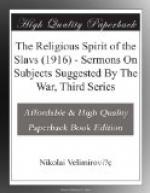Tolstoi perceived life as a circle, with the beginning everywhere and with the end everywhere. The Holy Synod, representing Slav Orthodoxy, perceived life as a drama with a beginning and an end in space and time. From his point of view, Tolstoi thought it possible for mankind to stop a mistaken course of things and to begin anew, to cast away all the burdens of culture, of State, Church, militarism, worldly ambitions, the vanities of towns, to draw the curtain on the past and to come back to the field and forest, to plough and sow, to listen to the life of Nature and to live with Nature and God in unison.
The Holy Synod, from their point of view, thought that the past is the very foundation of the present and future, and that in separating us from the past we were as an uprooted plant, condemned to inevitable death, while in continuing the world-drama we are going the only possible way. The beginning of sin in this drama is in Adam, the beginning of salvation is in Christ. We cannot live without taking notice even of the life of Adam and without connecting our life with Christ’s. And all the other millions of human beings between those two milestones, between Adam and Christ, and Christ and us, are greater or smaller foundations, or conditions, or even disturbances of our own life.
“My understanding is against your traditions,” said Tolstoi.
“Our traditions are against your understandings,” replied the Holy Synod.
But that was not all.
The difference existed also in views on
HAPPINESS AND ATONEMENT.
Tolstoi was much troubled by the suffering of men. He himself saw, felt and described an immense amount of this suffering in various forms. The problem of happiness was his most cherished problem. He believed that men can be made happy in this life, and even more—that they are created in order to be happy. He refused quite definitely the idea of atonement as inconceivable and contrary to the idea of God. Human life has been normal and happy as long as men lived their simple life without towns and without all urban complications. Life can again be made a normal and happy one as God wills, if we only return to the primitive simplicity of the peasants.
The Holy Synod was not opposed to the happiness of men, but they did not believe either that happiness is attainable in this world or that it is the aim of our life on earth. Did it not occur quite in the beginning of the world’s history that there lived on earth two brothers, Cain and Abel, two farmers, without any burden of culture, and with all the Tolstoian simplicity of life? Yet is it not reported that one killed the other?




